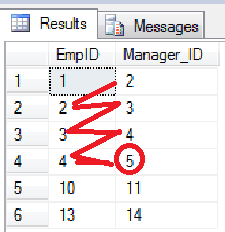How to update with new ID
-
April 23, 2018 at 4:48 am
Declare @a table ( id int, id_2 int)
Insert into @a( ID, id_2)
Select 1, 2
union all
Select 2, 3
union All
Select 3, 4
union All
Select 4, 5
union All
Select 10, 11
union All
Select 13, 14Select
* from @a
How can I get the below result set
The business concept is that if we have same data value is id and ID_2 and it will keep search till last highest ID_2 and Update the New_ID with that. Please help me to solve this problem..
-
April 23, 2018 at 5:31 am
Could you explain how rows 1-4 are related? They are different ids in your example. Also, explain what you are trying to achieve and post DDL as it will make helping you easier.
-
April 23, 2018 at 6:13 am

There is Zigzag data relationship and the last Manager ID has to be updated for all record which has this relationship
-
April 23, 2018 at 6:14 am
vijay_uitrgpv - Monday, April 23, 2018 4:48 AMDeclare @a table ( id int, id_2 int)
Insert into @a( ID, id_2)
Select 1, 2
union all
Select 2, 3
union All
Select 3, 4
union All
Select 4, 5
union All
Select 10, 11
union All
Select 13, 14Select
* from @a
How can I get the below result set
The business concept is that if we have same data value is id and ID_2 and it will keep search till last highest ID_2 and Update the New_ID with that. Please help me to solve this problem..
I am 200% confident that somebody will give better solution than this ...
create table cal_a
( id int, id_2 int);
insert into cal_a( ID, id_2)
Select 1, 2
union all
Select 2, 3
union All
Select 3, 4
union All
Select 4, 5
union All
Select 10, 11
union All
Select 13, 14;
alter table cal_a
add new_id int null;I am using 2 update to get the solution:
UPDATE cal_a SET new_id =
(Select MAX(a.id_2)from cal_a as A cross apply cal_a as B
where a.id=b.id_2)
where id in (Select b.id from cal_a as A cross apply cal_a as B
where a.id=b.id_2
union
Select a.id from cal_a as A cross apply cal_a as B
where a.id=b.id_2);update cal_a SET new_id =id_2
where new_id is null;I will also try to find a better solution than this ...
Saravanan
-
April 23, 2018 at 6:19 am
Depending on the logic, there are 2 options. Be sure to understand them as they're very different.
Declare @a table ( id int, id_2 int)
Insert into @a( ID, id_2)
Select 1, 2
union all
Select 2, 3
union All
Select 3, 4
union All
Select 4, 5
union All
Select 10, 11
union All
Select 13, 14;WITH CTE AS(
Select *, id - ROW_NUMBER() OVER(ORDER BY id) group_id
FROM @a
)
SELECT id,
CTE.id_2,
MAX(CTE.id_2) OVER(PARTITION BY CTE.group_id)
FROM CTE;WITH rCTE AS(
SELECT id, id_2, id_2 AS New_ID
FROM @a AS a
WHERE NOT EXISTS(SELECT * FROM @a AS a2 WHERE a2.id = a.id_2)
UNION ALL
SELECT a.id, a.id_2, r.New_ID
FROM @a AS a
JOIN rCTE AS r ON a.id_2 = r.id
)
SELECT rCTE.id,
rCTE.id_2,
rCTE.New_ID
FROM rCTE
ORDER BY id; -
April 23, 2018 at 6:21 am
You should probably scratch what I mentioned and read what I wrote on this article:
http://www.sqlservercentral.com/articles/set-based+loop/127670/ -
April 23, 2018 at 6:29 am
Luis Cazares - Monday, April 23, 2018 6:19 AMDepending on the logic, there are 2 options. Be sure to understand them as they're very different.
Declare @a table ( id int, id_2 int)
Insert into @a( ID, id_2)
Select 1, 2
union all
Select 2, 3
union All
Select 3, 4
union All
Select 4, 5
union All
Select 10, 11
union All
Select 13, 14;WITH CTE AS(
Select *, id - ROW_NUMBER() OVER(ORDER BY id) group_id
FROM @a
)
SELECT id,
CTE.id_2,
MAX(CTE.id_2) OVER(PARTITION BY CTE.group_id)
FROM CTE;WITH rCTE AS(
SELECT id, id_2, id_2 AS New_ID
FROM @a AS a
WHERE NOT EXISTS(SELECT * FROM @a AS a2 WHERE a2.id = a.id_2)
UNION ALL
SELECT a.id, a.id_2, r.New_ID
FROM @a AS a
JOIN rCTE AS r ON a.id_2 = r.id
)
SELECT rCTE.id,
rCTE.id_2,
rCTE.New_ID
FROM rCTE
ORDER BY id;Thank you very much this is working as expected
-
April 23, 2018 at 6:34 am
Luis Cazares - Monday, April 23, 2018 6:19 AMDepending on the logic, there are 2 options. Be sure to understand them as they're very different.
Declare @a table ( id int, id_2 int)
Insert into @a( ID, id_2)
Select 1, 2
union all
Select 2, 3
union All
Select 3, 4
union All
Select 4, 5
union All
Select 10, 11
union All
Select 13, 14;WITH CTE AS(
Select *, id - ROW_NUMBER() OVER(ORDER BY id) group_id
FROM @a
)
SELECT id,
CTE.id_2,
MAX(CTE.id_2) OVER(PARTITION BY CTE.group_id)
FROM CTE;WITH rCTE AS(
SELECT id, id_2, id_2 AS New_ID
FROM @a AS a
WHERE NOT EXISTS(SELECT * FROM @a AS a2 WHERE a2.id = a.id_2)
UNION ALL
SELECT a.id, a.id_2, r.New_ID
FROM @a AS a
JOIN rCTE AS r ON a.id_2 = r.id
)
SELECT rCTE.id,
rCTE.id_2,
rCTE.New_ID
FROM rCTE
ORDER BY id;Awesome...
Saravanan
-
April 23, 2018 at 6:35 am
vijay_uitrgpv - Monday, April 23, 2018 6:29 AMThank you very much this is working as expected
Have you read the article I mentioned? It offers a great performance improvement.
-
April 23, 2018 at 6:40 am
I have set this in my bookmark to read it later.. Thanks for sharing this.
Viewing 10 posts - 1 through 9 (of 9 total)
You must be logged in to reply to this topic. Login to reply
